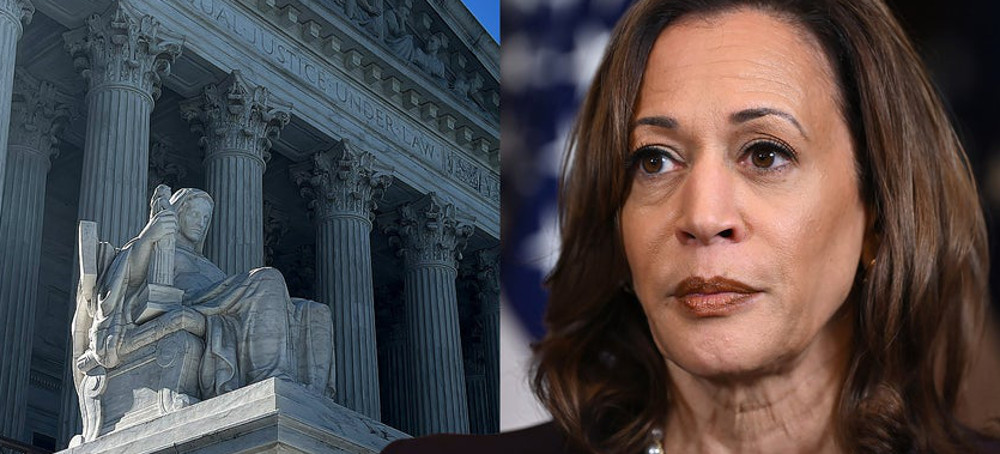How Kamala Harris Can Upend the Supreme Court’s Horrible Immunity Ruling in One Move
Lawrence Lessig Slate Nothing requires the president to accept immunity. (photo: Getty)
Nothing requires the president to accept immunity. (photo: Getty) How Kamala Harris Can Upend the Supreme Court’s Horrible Immunity Ruling in One Move
Lawrence Lessig SlateAmerican constitutional law has long struggled with the scope of implied presidential immunity. President Richard Nixon startled David Frost in his post-presidency interview when he asserted that “when the president does it, that means that it is not illegal.” In the narrow context he was describing, Nixon was right —not because of any monarchical power held by the president, but because of limits on the power of Congress to regulate certain acts of the president. If Congress can’t regulate a presidential power, Congress can’t make acts around that power “criminal.” This is the core of presidential immunity: the substantive limits on Congress’ power to regulate the president.
But immunity is not just about substance. It’s also about buffers. The core may be constitutional limits. The practice, however, extends immunity beyond that core so as to give presidents the breathing room they need to do their job effectively. How much breathing room is necessary is not determined by the Constitution. It is a judgment, a balance, chosen by the Supreme Court.
The Supreme Court has now extended that buffer in the context of alleged presidential crimes. No doubt, the court affirmed, there is no immunity for unofficial acts, or acts beyond the “outer perimeter of official responsibility.” But when unofficial acts are pursued through official means, and they involve core constitutional powers, then the president may not be held responsible for the exercise of that core presidential authority, and evidence from those official acts may not be demanded when prosecuting the crime.
Thus, in Trump v. United States, because the threatened removal of an attorney general is the exercise of core presidential power, evidence about threats to remove the attorney general if he didn’t help Trump overturn the results of the last election cannot be introduced in a prosecution for the acts taken to advance that unofficial objective. The same would apparently be true of an even more extreme example: If, in war, the president orders a general to assassinate a political rival, that order would be immune from prosecution since it involves a core presidential authority — even though its purpose was private, unprotected by the Constitution.
This is the offer of an extreme immunity. Nothing, though, requires any president to accept it. Instead, a president or candidate for president could openly pledge to waive any immunity from prosecution for any acts done to advance an unofficial objective, even if those acts included the exercise of core presidential authority. Issuing such a waiver could become a ritual in any campaign for president. Kamala Harris should begin that ritual tomorrow.
Presidents are free to make this pledge because the breadth of the immunity now granted by the court is not compelled by the Constitution. It is a practical judgment by six justices that presidents need such a buffer to be able to act with “vigor.” But a president or candidate for president could make a different judgment, and declare that they don’t need the extra protection the court has afforded them. “Thank you very much,” a candidate could say, “but I waive any immunity from prosecution for any criminal acts done to promote unofficial ends, including any immunity for official acts done to promote that private crime.” So long as Congress has the power to regulate those acts, that waiver would mean that the president is not above the law.
Not every candidate would make such a pledge. The public would then be right to wonder why a candidate wouldn’t. It is one thing — and certainly true—to say that a president needs to be able to act with vigor within the “outer perimeter of his official responsibilities.” It is quite another to say that the presidency depends upon being able to use official authority to commit private crimes. The Supreme Court’s decision leaves the president presumptively immune from prosecution in such cases—unless a president waives that immunity.
If a series of presidents and candidates for president made this pledge, that would build support for the most likely repair of Trump v. United States—an act of Congress. The court acknowledged Congress has this power in Nixon v. Fitzgerald, when it recognized that Congress could, within limits, modify the immunity that it was granting the president. Presidents could modify it as well, at least as it affected them.
No one, including the president, should be above the law. Congress should make that claim true for all presidents. A candidate for president—such as Kamala Harris—could make that claim true for themselves now.
